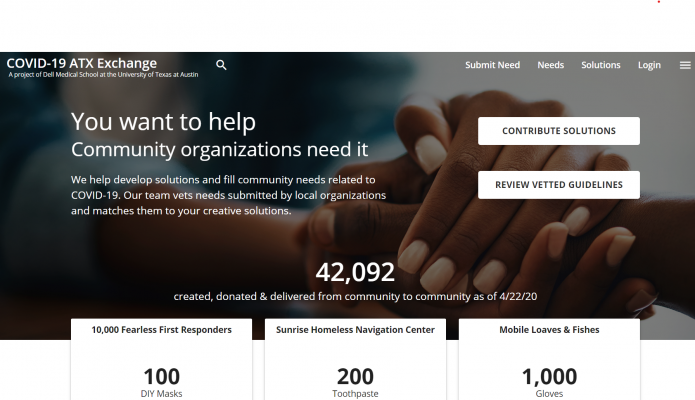“Our goal was the health of this community. With COVID, I was watching the intense focus on healthcare and the vacuum around it getting bigger and bigger. We wanted to bridge that gap.” — Dr. Mini Kahlon
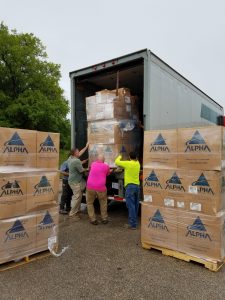
The COVID-19 ATX Exchange is helping distribute urgently needed masks and supplies, such as the hand sanitizer (above) produced by Garrison Brothers Distillery and bottled and unloaded by volunteers at Siete Foods and Ponder Foods (Credit: Dell Med)
Like many frontline workers around the country, Austin’s Meals on Wheels employees were woefully low on face masks to protect themselves and their clients.
But thanks to an innovative project called the COVID-19 ATX Exchange — a project of Dell Medical School at the University of Texas at Austin — they were matched up with volunteers who sewed hundreds of masks in a matter of days, after which the entire batch was sterilized and delivered them to the nonprofit.
“Meals on Wheels Central Texas is so deeply grateful for the generous donation of face masks,” said Thad Rosenfeld, vice-president of communications for Meals on Wheels Central Texas, which serves approximately 3,000 clients. “The coverings make a world of difference in protecting the health and safety of those we serve as well as that of our hard-working staff.”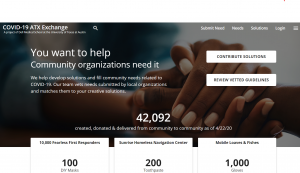
The ATX Exchange is an online clearinghouse that brings together experts, innovators and leaders to create community solutions to critical COVID-19 needs, according to Dr. Maninder “Mini” Kahlon, a neuroscientist and founding vice dean of the Health Ecosystem at Dell Medical Austin. Since it opened in late March, the ATX Exchange has already matched frontline responders and others with more than 42,000 items such as masks, face shields, hand sanitizer, disposable gloves, tents, and toothpaste. “Someone in the community posts a need, experts at Dell Med vet it, and the community comes up with a creative solution,” she explains.
In fact, Kahlon and her colleagues at Dell Med were able to create the COVID-19 ATX Exchange within a week – something she attributes to a deep knowledge of the community. “It was very rapidly put into place because obviously there was a need,” she said. “We had all the connections to make it happen. The traction we’ve had was a bit of surprise, and a welcome one. Our goal was the health of this community. With COVID, I was watching the intense focus on healthcare and the vacuum around it getting bigger and bigger. We wanted to bridge that gap.”
Looking at the clearinghouse, readers can see requests for everything from sterilization tools to do-it-yourself masks. How does the ATX exchange ensure that the masks and other donations are safe and of high-quality?
Kahlon explains that experts at Dell Med vet the volunteer groups as well as donations’ design and specs.
“One of our most vibrant arms is the maker community,” Kahlon says, adding that the website is the logistics arm. “It’s a tale of two lanes: emergency rooms and public health. We didn’t want community workers who needed masks to sink down to the bottom of the public lane – that just wasn’t going to happen. We said, ‘Even though you can’t get N95s, reserved for healthcare, we will vet the design of the do-it-yourself masks.’ In our different channels, someone has enough expertise to vet each of the makers and tell them, ‘No, this won’t do, or this could be worked out.’ Not only would we monitor numbers, but we could play a role in the supply chain control and quality. So before we accept someone as a maker, we vet the process.”
The kind of design depends on the recipient, she adds. The ATX is also sourcing all kinds of personal protective equipment (PPE) donations, which are not do-it-yourself projects. “If we get a request from healthcare workers needing N-95s, we can’t use DIY masks,” Kahlon explains. “But a range of folks, such as those delivering Meals on Wheels, could definitely use them. Meals on Wheels delivery workers are at risk [of COVID-19], and we can’t leave our elderly population at risk because those supporting them don’t have masks.”
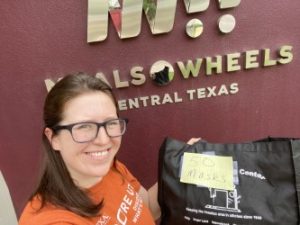
Kathyrn Kalinowski drops off a batch of 50 masks for the Central Texas Meals on Wheels volunteers. (Credit: Dell Med)
That’s where the ATX Exchange comes in. As part of a medical school responding to a pandemic, the ATX Exchange could respond quickly to Meals on Wheels’ urgent request for masks. “Because of our institutional setting,” Kahlon explains, “we were part of an operating center in the chain of command, thank god, and we could tell Meals on Wheels, ‘We’ll put that on the list and that is going to happen.’”
Meals on Wheels Central Texas has temporarily suspended daily meal deliveries in order to protect clients, staff and volunteers during the COVID crisis, but it is distributing two-weeks’ worth of meals to all its clients every other week. The nonprofit used the first batch of masks from the exchange for its In-Home Care division’s attendants, who continue to provide essential in-home care services to help clients remain safe in their homes. “Our caregivers are trained to comply with all required health and safety precautions, and pre-screen themselves and the clients they serve for symptoms of COVID-19 and other illnesses prior to delivering these services,” says Rosenfeld. “The donated masks help us achieve those standards.”
“We treasure the great working relationship our agency has with Dell Medical,” he adds. “Our city is lucky to be home to such a fine institution.”
The COVID-19 ATX Exchange is also supporting a national campaign called disinfectconnect.com, which connects distilleries — many of which are pivoting to expand the use of their high-proof alcohol to hand sanitizer — to frontline and essential workers. The exchange has accepted donations of hand sanitizer from a variety of local sources, including Garrison Brothers Distillery, Stonegate Pharmacy, Austin City, and Hye Distillery. At first the exchange simply called every local distillery to ask about possible donations, and Garrison Brothers — the first and oldest legal distillery in Texas — was among the first to respond. (“Stay safe y’all – we love you!” is how it signs off its message to customers about its Operation Crush COVID campaign with Team Rubicon.) For the ATX Exchange, the distillery donated the hand sanitizer it made in batches of five-gallons buckets, which volunteers would then pour into plastic bottles and help distribute. “With the expertise we’ve gained on the local exchange, we’re providing guidance on how distilleries prioritize who the sanitizer goes to,” Kahlon says.
Beyond the pandemic
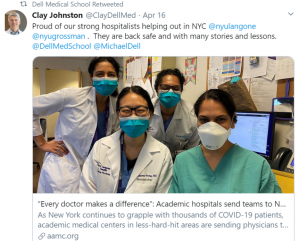 The ATX clearinghouse will likely be relevant long after the COVID pandemic, predicts Kahlon, who lived in the San Francisco Bay Area for more than 20 years and worked on a similar crowdsourcing project at the UC San Francisco School of Medicine, where she taught neuroscience and directed the Clinical and Translational Science Institute. Part of a small contingent of UCSF expats at Dell Med, she loves the school and her work there. Her main focus at Dell Medical is on the health ecosystem, a mission both complex and transformative.
The ATX clearinghouse will likely be relevant long after the COVID pandemic, predicts Kahlon, who lived in the San Francisco Bay Area for more than 20 years and worked on a similar crowdsourcing project at the UC San Francisco School of Medicine, where she taught neuroscience and directed the Clinical and Translational Science Institute. Part of a small contingent of UCSF expats at Dell Med, she loves the school and her work there. Her main focus at Dell Medical is on the health ecosystem, a mission both complex and transformative.
“This may be the last time we get to redesign a medical school in a research university setting, because no tier-one university lacks one now,” Kahlon says. “We wanted to radically improve how we deliver health and tie our measurements to community impact – a whole health ecosystem is necessary. We want a strategic initiative that is not like an also-ran, but one embedded within the community, the Chamber of Commerce, the Austin public health department.
“We are looking through both lens, as a leader in health and also in health beyond healthcare. We support midwife service and immigrant care as well as the homeless and people who work hourly jobs and don’t have financial assistance coming in,” she continued. “With that kind of foundation, we were clear to begin building.”
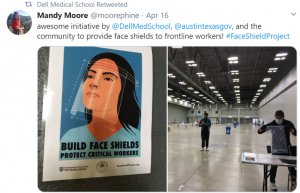
Perhaps the most enticing aspect of the COVID ATX clearinghouse is that it could theoretically be reproduced by any health system. “For this to be replicated, it’s most critical to have a trusted anchor institution,” Kahlon says. “It can be a formal or informal hub, but it has to be useful and broadly trusted by a variety of stakeholders. It doesn’t have to be medical, but it should be connected with providers and trusted by the city, and ideally it should have a connected health and medical expertise.”
In addition, Dell Med has volunteered to help out, especially since the need for personal protective equipment is so great. “It’s open source in a sense; it’s in the cloud but it’s not as easy to replicate as it might seem,” she says. “However, it’s something we could spin up in a day or so. We’d be happy to help create the instance, and provide guidance on the systematic vetting and logistics that underlie the system. And other healthcare institutions can take it from there.”
![]()
VOICES FROM THE FIELD: INNOVATING DURING THE COVID-19 CRISIS
This series is based on the extraordinary work that frontline health care staff are doing in the current public health emergency. Do you want to share a story about COVID-19 and the health care safety net? Please get in touch!
Find this useful or interesting? We’re constantly sharing stuff like this. Sign up to receive our newsletter to stay in the loop.

